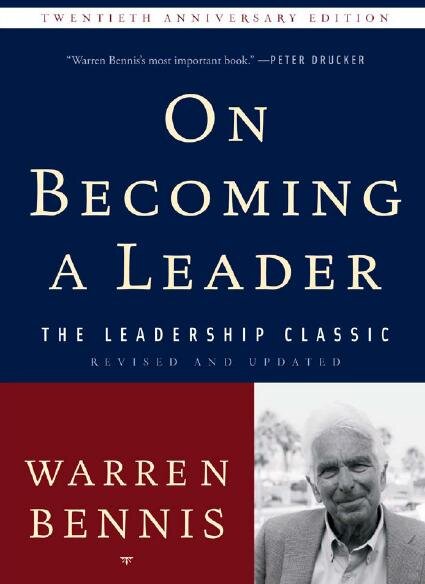Warren Bennis, On Becoming a Leader: The Leadership Classic. Revised Edition. Basic Books, 2003.
- Prequel: Bennis and Nanus, Leaders: Strategies for Taking Charge
- Sequel: Bennis and Goldsmith, Learning to Lead Workbook
Referenced in: Empowering Leadership
LifeandLeadership.com Summary
Bennis discusses a kind of leadership that is both transformational and empowering. This volume is largely an expansion on the insights of Bennis and Nanus, Leaders: Strategies for Taking Charge, illustrating how thirty outstanding leaders live out the principles from that book. The biographies of the leaders appear at the end.
One may not agree with Bennis’ choices of role models, and his recurring political innuendos may throw off readers who are aligned differently, but this should not keep one from reading the book. The essential difference between this text and Leaders, is that Leaders describes effective leaders, while On Becoming a Leader provides guidance toward becoming an effective leader. For example, Leaders talks about the importance of communication, On Becoming encourages leaders to put their thoughts in writing for greater clarity. Leaders elevates the importance of self-management, On Becoming presents a thorough process for self-reflection. Leaders discusses the importance of knowing the world at large, On Becoming advises one on how to do this.
In the spirit of Ken Blanchard, Bennis weaves his insights through the story of a fictitious middle-aged executive named Ed, who had a lot of what it took to succeed in organizations of the previous era, but when moved into a climate that demanded new era leadership, faced hard lessons of personal issues and interpersonal incompetence. Some come upon this self-knowledge early, but others get it later, like Harry Truman and Teddy Roosevelt in their middle years. Bennis says it does not matter because self-knowledge, self-invention are lifetime processes. Leaders will appreciate Bennis’ coaching to know yourself, know your world, listen to and follow your inner voice, plunge full bore into a guiding vision, learn from good mentors, strike hard, try everything, manage chaos, and get people on your side.
Below is a list of other gems from this text:
Four steps in mastering context: (1) becoming self-expressive; (2) listening to the inner voice; (3) learning from the right mentors; and (4) giving oneself over to a guiding vision. (28)
Three basic ingredients of leadership: (1) a guiding vision – knowing what he or she wants to do, personally and professionally, and the know-how and persistence to get there ; (2) passion – the leader loves what he or she does and loves doing it; and (3) integrity –self-knowledge, candor, maturity (31-32)
Two principle modes of 1) conventional learning – designed to maintain an existing system or an established way of life; 2) shock learning – occurs when events overwhelm people, sometimes following a period of overconfidence. These two are less learning than they are accepting conventional wisdom. These must be replaced with innovative learning – being active and imaginative, listening to others, and shaping events rather than being shaped by them. (68-69)
Leaders rely as much on their intuitive and conceptual skills (right brained) as on their logical and analytical talents (left-brained). These people are whole-brained, capable of using both sides of their brain. (95)
Mistakes must be allowed. If mistakes are viewed as bad, those made at the top must be hidden and the learning from the ignored or reinterpreted, and those made at the bottom must be concealed. Good leaders not only see the necessity of mistakes, they seem them as virtually synonymous with growth and progress. Leaders don’t always see failures as mistakes. (87) Mistakes contain potent lessons, but only if we think through them calmly, see where we went wrong, mentally revise what we are doing, and then act on the revisions. (109)
From the Publisher
The classic book that captures the essence of leadership like none other—expanded and updated for tomorrow’s leaders, with a new introduction by the author.
Warren Bennis’s formative years, in the 1930s and ’40s, were characterized by severe economic hardship and a world war that showcased the extreme depths and heights to which leaders could drive their followers. Today’s environment is similarly chaotic, turbulent, and uncertain. On Becoming a Leader has served for nearly fifteen years as a beacon of insight, delving into the qualities that define leadership, the people who exemplify it, and the strategies that anyone can apply to become an effective leader. This new edition features a provocative introduction on the challenges and opportunities facing leaders today, with additional updates and current references throughout.
About the Author
Warren Bennis is Distinguished Professor of Business Administration at the University of Southern California and a consultant to multinational companies and governments around the world. He also chairs the Advisory Board of the Kennedy School’s Center for Public Leadership at Harvard University. He is author of more than thirty books and dozens of other articles on leadership, including Managing the Dream, Organizing Genius, and Learning to Lead. He lives in Santa Monica, California.
***For additional information on this resource, including reviews, click the bookstore links. Check the reference at page top or the links below for resource guides on related topics.***
See Other Resources on Leadership:
See Resources on Over 100 Areas of Ministry Leadership:


